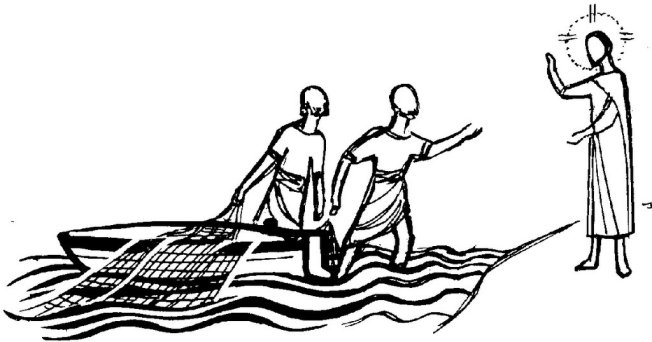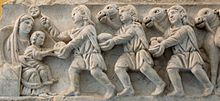“Hope and Wholeness”

Mark 1:21-28 (1:27) – January 28, 2018
A common saying is “You only have one chance to make a first impression.” How true that is! A close parallel is beginning a new position. A great deal is riding on that first impression, the first few days or weeks at a new job, the first major thing or statement a prominent person does or says.
Our Gospel reading today from Mark chapter 1 happens at the very beginning of the Rabbi Jesus’s ministry. Jesus is beginning this new position as an itinerant rabbi, traveling around the countryside, preaching and teaching. What else does Mark include here? This is a narrative of an important first thing that this prominent person Jesus says and does, setting the tone for the rest of Mark’s Gospel. I’d like to thank bible commentator Paul Berge for his fictional first-person account, which is a narrative adaptation of this first miracle of Jesus.
“Were you at the synagogue in Capernaum today? I wasn’t sure I saw you and so I will tell you as clearly as I can what happened. I can only explain that something occurred that has never, yes, never ever happened before in our hometown synagogue where our people “gather together.” What took place is unlike anything our rabbis have instructed us in over the years. This was far beyond their teaching and authority.
“Shabbot worship started out like a routine, very normal gathering. We all came with the usual expectation. Now, don’t get me wrong, our rabbis are faithful interpreters of the Torah as they instruct us in the Word of the Lord, but their teaching does get to be routine. Everything was progressing as usual, the prayers, the Psalms, the reading of the Torah, when a newcomer “immediately” entered the synagogue and began teaching and instructing us, dare I say, with a new “authority” (Greek, exousia). His authority was not as our scribes. When I use the word “authority” about his teaching, you know that the word also includes the power to “exorcize” demonic spirits.
“I am still in shock as to what happened next. “Immediately” a deranged person screams out. No one in the synagogue had a clue as to what brought forth this outburst. It appears an unclean spirit had identified this rabbinic-like teacher as one who had authority to exorcize and called out to him by name: “What have you to do with us, Jesus of Nazareth? Have you come to destroy us?” The voice was a shrill demonic-like scream. How did this spirit know the name of the rabbi from Nazareth? Did the voice really assume that this teacher has the authority to exorcize demonic or unclean spirits?
“The scream continued with words of blasphemy using the name of God: “I know who you are, the Holy One of God.” With this a hushed silence came over the entire synagogue as these words were spoken. The rabbi named Jesus from the hill country of Nazareth sensed the offense of these words, and the identity of the Holy One of God. Jesus addressed the possessed man and rebuked him with exorcizing words which likewise silenced the entire synagogue, “Be silent, and come out of him.”
“What occurred next was a demonstration I have never, ever, witnessed before. The man was writhing on the floor like he was in conflict with the spirits possessing him. Then the voice of a demonic spirit cried out with the same shrill demonic-like scream. The unclean spirit came out of him and the man appeared to be calm. He stood up and in his right mind looked as normal as any of us.
“Needless to say, we were all overcome and amazed and kept saying to one another, “What is this? A new teaching — with authority he exorcizes a demonized person!” What took place we saw with our own eyes that he commanded even a host of unclean spirits and they were obedient to him. On my oath, this is what took place on this Shabbot. I can’t explain what came over us, but it was like we gave witness to the rabbi from Nazareth as our praise to the one, holy and righteous God in our midst. We have no other experience like this to compare. We have since heard that what took place in our synagogue “immediately” spread throughout the surrounding region of Galilee.” [1]
Do you hear what Jesus did? He cast the unclean, evil spirit out of the man, and made him whole again. Gave him a new lease on hope and wellness. Gave the man the gift of emotional, psychological and mental wholeness, of abundant life itself.
Not everyone believes that Jesus casts out evil, unclean spirits from people, in the spiritual realm. Some people are very skeptical about this kind of miracle. But, I would like to remind everyone that belief in evil spirits has been a common, widespread belief for thousands of years. It does not as much matter that many people of the 21st century don’t believe that Jesus did this. The point is that the people of New Testament times did believe in the power and authority of the Rabbi Jesus. Power to cast out unclean spirits.
For thousands of years, society has dealt with different kinds of mental, emotional and psychological issues in individuals. Sometimes, these issues and illnesses have been called spiritual and demonic. From what we now know, these conditions can be medical. These people with illnesses and issues sometimes seem to be held hostage to internal, powerful forces only recently understood.
Regardless of whether the illness or issue was emotional, physical, psychological or spiritual, Jesus came alongside of this man with an unclean spirit. Maybe Jesus was the first who had approached the man in a long time. Jesus, with holy power and authority, ordered the evil spirit out of the man. And, immediately, the man was cured.
Was it really and truly an “evil spirit?” In this case, as in certain other situations in the Gospels, My opinion is, “yes.” There are a great many situations which are spiritually energized, throughout the world. Both positive and negative, concerning good and evil spirits.
But, that is not the only thing. No, there are negative tendencies, urgings, and thoughts people get in their heads, on their insides. An explosion of anger, over and over. A suicidal impulse or thought. An intense jealousy, suddenly flaring. A wild sexual fantasy that returns again and again. An overwhelming feeling of depression and dread, creeping into the deepest places inside. We, as human beings, are keenly aware of these unwelcome, unclean spirits in our hearts and inner thoughts. We often wonder where these “unclean thoughts” come from and why we can’t get rid of them. It is as if they are part of our inner nature as human beings. [2]
It does not matter whether our issues are psychological, physical, emotional, spiritual, or some combination, Jesus can come alongside of us. Jesus has the power and authority to take care of the situation and restore hope and wholeness. Yes, in this situation in Mark’s Gospel, with this troubled young man. And, yes, in a multitude of various situations, today, too.
Today, you and I are often ashamed of individuals such as this troubled man. We tend not to speak of it. We fear the misunderstanding or the judgment or avoidance we expect we will surely see in the eyes of others. Or, hesitate to choose to whom we dare to entrust that which hurts us the most. [3] Whether we name it evil spirits, mental disturbance, emotional instability, addiction, or something else, Jesus can overcome. Jesus can provide healing, hope and wholeness, whatever the situation. Yes, in Mark’s gospel, and yes, in all of our lives, today.
(A big thank you to Dr. Paul Berge, who wrote the adapted first-person account of this Scripture reading from Mark 1:21-28. Thank you for this writing, and for your excellent insights from your Gospel commentary!)
[1] http://www.workingpreacher.org/preaching.aspx?commentary_id=1122
Commentary, Mark 1:21-28, Paul S. Berge, Preaching This Week, WorkingPreacher.org, 2012.
[2] http://www.sermonsfromseattle.com/series_b_hunger_for_healingGA.htm “Hunger for Healing,” Gospel Analysis, Sermons from Seattle, Pastor Edward F. Markquart, Grace Lutheran Church, Seattle, Washington.
[3] http://dancingwiththeword.com/out-in-the-open-casting-out-unclean-spirits/ Janet H. Hunt.
(Suggestion: visit me at my regular blog for 2018: matterofprayer: A Year of Everyday Prayers. #PursuePEACE – and my other blog, A Year of Being Kind . Thanks!)




